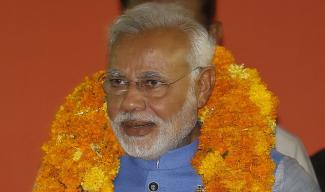Identity politics
A dangerous choice

Opposition parties don't win elections; governments lose them. In India, the Congress party, which ran the country in the past ten years, has been adrift for at least five years. It wasted an entire term during which it did not achieve anything else than huge corruption scandals. Its Food Security Bill was only passed last year, too late to prove any lasting impact.
Things were different five years ago. In 2009, the Congress won comfortably thanks to the innovative Mahatma Gandhi National Rural Employment Guarantee it had introduced. This welfare scheme had improved the lives of many poor families. The victory was pyrrhic however. The Congress no longer depended on left-wing allies to form the government and became complacent.
Since the Congress deserved to lose the election this year, the Bharatiya Janata Party (BJP) seemed the obvious choice. Led by Narendra Modi, who has been chief minister of Gujarat for more than a decade, it is India's other big party with a national presence. Modi's reputation of a strong politician who gets things done was reinforced by impressive economic growth in his state.
Modi won a democratic election, but he is dangerous nonetheless. His party has close ties to the Rashtriya Swayamsevak Sangh (RSS), a Hindu-chauvinist organisation with a violent history. Modi's rise to the top of the party started in the RSS. On his watch, some 1000 Muslims were killed in pogroms in Gujarat in 2002. The law courts did not find him guilty of active involvement, but he definitely failed to make the police stop the bloodshed. Modi never disowned the perpetrators.
In the eyes of the RSS, India is a nation of and for Hindus. The RSS and the various other organisations it has spawned aspire a role of international leadership for their country. Fanatics want a Hindu temple to be built at the site of Babri mosque in Ayodhya moreover. That mosque was torn down by BJP-led fanatics in 1992. The event sparked bloody riots in India, Pakistan and Bangladesh. The rabid intolerance displayed by fanatics towards Muslims reminds many Germans of the Nazi's genocidal attitudes towards Jews. Many RSS radicals now feel their time has come.
The BJP has a radical as well as a moderate wing. Under Atal Bihari Vajpayee, who was prime minister for the BJP at the turn of the millennium, things stayed quiet in Ayodhya. Vajpayee's government, however, depended on coalition partners and, unlike Modi, he was never considered a hardliner. The fanatics expect more to happen this time.
During the campaign, Modi remained ambivalent on these matters. Emphasising ecomomics, he neither fanned the flames, nor disowned the Hindu-chauvinists. The electorate expects him to deliver an economic miracle fast. India has many young voters for whom the riots seem to have occurred in the distance past. Many people are likely to feel disappointed fast if Modi fails to deliver.
Observers point out that Modi will not be able to impose a dictatorship on his nation. India is indeed extremely diverse. Hinduism, moreover, does not lend itself easily to identity politics. Fewer than 50 % of Indians probably consider themselves Hindus in the sense promoted by the RSS. Moreover, the separation of powers is deeply entrenched in India. The state governments wield considerable influence, and the judiciary is independent. Modi will try to boost the economy in order to make the BJP seem to be the natural party of government, slowly entrenching a Hindu-chauvinist understanding of the state. The danger is that he may look for scapegoats should things not go as planned. He'll be tempted to unleash the RSS hooligans. The bloodbath in Gujarat, after all, did not hurt his career.
He will now enter the international arena. Historically, falcons such as Ronald Reagan or Menachim Begin have managed to make peace. Accordingly, Modi's relations with Pakistan need not become traumatic. Inviting the neighbouring country's Prime Miniser Nawaz Sharif to his inauguration was a good start. Pakistan, however, is struggling with its own fanatics. Matters could fast spin out of control should Muslim radicals attack India in the hope of raising their profile.
For good reason, Indians want change. Let's hope change proves to be non-violent.







